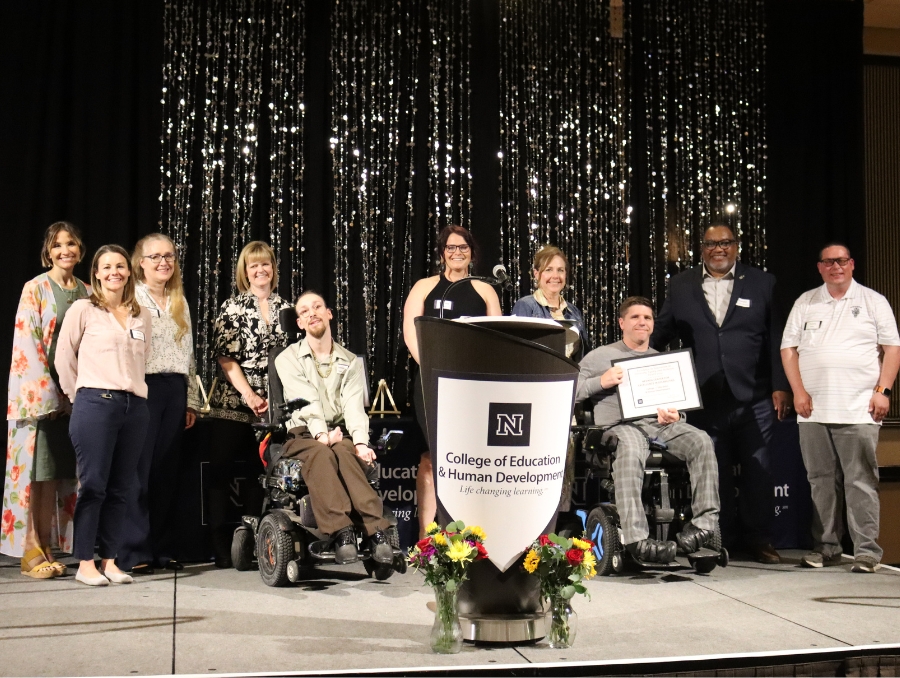James Santini, former Congressman for Nevada and a 1959 graduate of the University, passed away on Tuesday from cancer. He was 78.
Santini was remembered by colleagues, friends and political writers across the state for his gracious nature, his sense of humor, and his substantial body of work as a Congressman. He served as the lone representative from Nevada in the U.S. House of Representatives from 1974-83.
Veteran political writer Jon Ralston, who has covered all of the major races and political figures in the state for nearly 30 years, wrote that Santini "... will be remembered as one of the more accomplished federal lawmakers in Nevada history, a man who loved to legislate and who passed many bills as the state's only Congressman in the 1970s. ... His legislative instincts were killer - he passed the Santini-Burton Lands Act, a prescient law that was a precursor to the Southern Nevada Public Lands Management Act." (Editor's note: The Southern Nevada Public Lands Management Act has since helped fund millions of dollars of environmental work to save Lake Tahoe's legendary clarity as well as for other projects throughout the state.)
Congressman Santini's good friend and ATO fraternity brother from the University, former Nevada Gov. Richard Bryan, told Ralston, "Jim had a mesmerizing personality. He knew how to inject humor. He was good at retail politics."
Congressman Santini's ties to the University were historic and substantial.
His family's lineage ran through the campus as deeply as the giant elm trees on the Quad. His family's roots, in fact, were set at the University not long after the first of those wise old trees was planted on the Quad in 1908.
His grandfather, Walter Clark, served as University President from 1918 to 1938, while his mother, two uncles - one of whom was the renowned author, Walter Van Tilburg Clark - his brother, Clark Santini, and his aunt all attended the university.
"The blue and silver blood of the University of Nevada has flowed through my veins from birth," Congressman Santini said.
For a few weeks in 2009, I had the distinct pleasure of working with Congressman Santini. He had been chosen to write what has become an annual feature in the printed Spring Commencement program, a personal recollection by one of the members of the Golden Reunion Class for that particular year.
Congressman Santini, along with good friend and classmate Richard "Whitey" Bryan, were among the members of the Class of 1959. Bryan, who was student body president in 1959 (and would go on to be elected Governor of Nevada, as well as U.S. Senator), had encouraged Santini, who had been senior class president that year, to write the Golden Reunion essay in spring 2009.
"My good friend Dick Bryan has told me I need to 'hit it out of the ballpark,'" Santini said during our first conversation. He sounded a bit pained. I learned quickly it was all for effect. He was setting up a humorous punchline. He added with that characteristic, self-deprecating sense of humor of his: "No pressure, right? I think I'm going to need written authorization from the University for me to distress the legion of Richard H. Bryan admirers as I fill in for him in this capacity."
As I quickly learned, however, Congressman Santini was a good writer, and an excellent communicator.
It took only two drafts for his essay to shine. Only one problem. Such a rich life, so well-lived, with so many memories, made it difficult for Congressman Santini to pare things down.
"Sorry," he admitted at one point, as his essay surged well beyond our 750-word quota. "My legal education doesn't permit me to conform within word limitations."
What we ended up with was an 807-word essay that blended a sense of how the campus was, how the seasons had blurred, and how the recollection of advancing years could make those memories all the more poignant.
His essay was in many ways just like the man: accessible, and easy to interact with. Just as Jim Santini was easy to talk to, so too did his writing contain an enduring universality that helped to comfortably bring you into his orbit and the world he'd inhabited at the University.
His writing was a revisiting of a time that we all experience while college students, one populated with memorable people, all doing a combination of somewhat goofy and sometimes very serious things - all in preparation for the life that is still to come.
Some of the first elected offices that the state's future Congressman, Santini, and its future Governor, Bryan, ever held were celebrated in the finest tradition of college kids just having fun.
Wrote Congressman Santini: "A Student Court was created in 1958 to determine appropriate disciplinary action for undergraduates who violated campus rules. Fortunately for me, neither the newly-elected student body, President Dick Bryan, nor the senior class president had to appear before the Student Court as a result of our involuntary midnight swim in Manzanita Lake. Our unplanned trespass occurred when our fraternity brothers tossed us into the water to celebrate our recent election victories. The Jot Travis Student Union was complete in 1958 -- just in time for Dick 'Whitey' Bryan to occupy the new Student Body President's office. ... The completion also gave me the opportunity to slide down its new banister."
Stepping back into time, Congressman Santini didn't rely on the cliché that it was a simpler, better time. He didn't have to. He used examples taken from his time as a student, and let them paint a vivid picture of what campus life was like back then.
It was a time when the Wolf Den and "original" Little Wal were popular. When students living in fraternity and sorority house wandered downtown regularly, eating "apple pie ala mode at the Wigwam Cafe." The Wolves Frolic was a major event. Mackay Day was a campus-wide celebration, complete with its own song teams.
And yet seeds were being sown for future political achievement. To be a member of the speech and debate teams of Drs. Robert S. Griffin and William C. Miller was a badge of supreme honor, something that the 1957-58 debate team of Bryan/Santini took seriously. Griffin had come to the University in 1928 at the request of Santini's grandfather, President Walter Clark; Miller joined the faculty in 1932 and for more than 40 years directed theater productions and was not only chair of the speech and drama department, but also at one point served as the chair of the English department.
Under their guidance were the young Santini and Bryan.
Think about that pairing for a moment. Two young men, their words firm as their crew cuts, taught by a couple of the University's finest oratorical and drama professors, serving as debate team partners.
It makes one wonder if other universities could ever make a similar claim of having a future U.S. Congressman and a future Governor and U.S. Senator on the same college debate team.
And even if they did, I would dare them to say their team could beat our team - two astute, intelligent, well-spoken young men who as they grew older never forgot who they were, who were never drawn to the theatricality of political extremes, but rather, who always embraced the abiding appeal of the commonsense and the traditional, and who both practiced politics as it should always be practiced, as a collaborative amalgam of people and processes, personalities and policy.
And here again was where I learned more about Congressman Santini's personal humility. On the phone, he downplayed the accomplishments of his debate career.
"We had some minor victories," he said of the pairing with Bryan.
I pressed him a bit further.
"But you and Gov. Bryan ... together on a debate team ... two really great communicators together ... that must've been a powerhouse team?"
Like Gov. Bryan, whose memory and recall of pertinent of facts is legendary, Congressman Santini knew exactly how to reply to the complimentary language that was being heaped upon him.
Instead of receding into the past, Congressman Santini stepped forward, evoking the promise of the young rather than the comfortable nostalgia of the old.
He reflected my praise onto someone else.
Earlier in 2009, two University students, Max Alderman and David Pena, had made history by winning two national parliamentary debate titles. In addition to Congressman Santini's prowess as a debater, his brother, Clark, was also a talented public speaker, a former Griffin debate team protégé and a University graduate. In fact, the W. Clark Santini Cup is granted each year to a person who, through, oral communication, has brought significant benefits to the community as a whole.
"And now Max Alderman and David Pena ... wow," Santini said, growing excited. I remember thinking at the time he sounded like an NFL insider waxing excitedly about the pairing of two rare, complementary talents like John Unitas and Raymond Berry, or Joe Montana and Jerry Rice. In addition to excitement, Congressman Santini sounded proud - proud of his alma mater, and proud of the newest generation of Jim Santinis and Dick Bryans. "Alderman and Pena ... now that's a championship debate team worth talking about. I think we would have met our match against those two young men."
As I learned during those couple of weeks of emails and phone calls with Congressman Santini, he was a person who was proud of his family, and proud of where they had all come from, though he wasn't completely tethered to that past.
This was a man who had a notable career in Nevada politics, and after that chapter closed, had an equally notable career as a lobbyist in Washington, D.C., working as co-founder of the bipartisan Congressional Travel and Tourism Caucus, and later serving as legislative counsel for the National Tour Association. The National Tour Association in 2011 named an award in Santini's honor. Santini was also known as an advocate for Native American issues, and for people with disabilities.
In 2014, Santini was named a Distinguished Nevadan by the Nevada System of Higher Education.
But to him, he was no different than his classmates. He remembered them all warmly, and with deep respect.
As he wrote in his Golden Reunion essay: "The number of university '59 alums that went on to become successful leaders in their communities after graduation was a clear reminder to me of the sheer number of truly talented people we had on our campus then. It is a great testament to the accomplishments of the class of '59. I hope that in some small way our class laid the groundwork for the extraordinary success of UNR students and graduates that were to follow."
In early June a few weeks after Commencement was held in 2009, a small card arrived in the mail for me here on campus.
A hand-written note of thanks from Congressman Santini was inside.
I forget exactly what the specific message was. I do remember clearly, though, that there was a reference to the fact that in 25 years, for the 75th anniversary of the class of 1959, his dear friend and former debate team partner, Richard H. Bryan, would most assuredly need to be convinced to write the Golden Reunion essay for that year's Commencement program.
And that, as I've come to realize six years later, was quintessential Jim Santini.
He was always one to act in the most gracious and memorable of ways.
Yet in reality, the pleasure, the privilege, the prize of interacting with a special man, with special personal gifts, was all ours.
(Editor's Note: John Trent is the Senior Editor for News & Features at the University. According to the Associated Press, Congressman Santini, who recently celebrated 47 years of marriage to his wife, Ann, is survived by six children and 13 grandchildren.)










